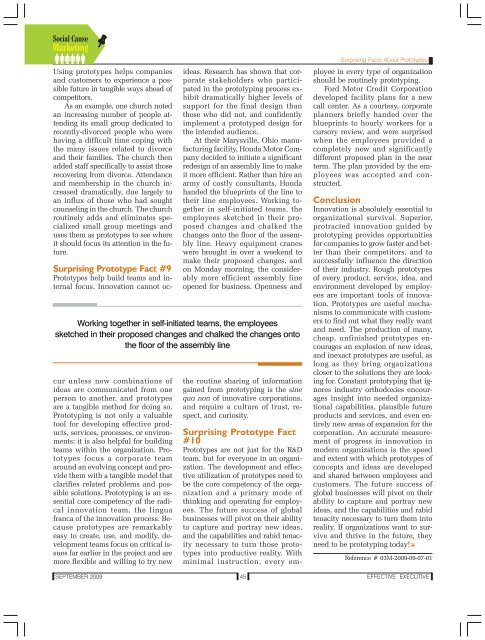Social Cause Marketing - The Regis Group Inc
Social Cause Marketing - The Regis Group Inc
Social Cause Marketing - The Regis Group Inc
Create successful ePaper yourself
Turn your PDF publications into a flip-book with our unique Google optimized e-Paper software.
Using prototypes helps companies<br />
and customers to experience a possible<br />
future in tangible ways ahead of<br />
competitors.<br />
As an example, one church noted<br />
an increasing number of people attending<br />
its small group dedicated to<br />
recently-divorced people who were<br />
having a difficult time coping with<br />
the many issues related to divorce<br />
and their families. <strong>The</strong> church then<br />
added staff specifically to assist those<br />
recovering from divorce. Attendance<br />
and membership in the church increased<br />
dramatically, due largely to<br />
an influx of those who had sought<br />
counseling in the church. <strong>The</strong> church<br />
routinely adds and eliminates specialized<br />
small group meetings and<br />
uses them as prototypes to see where<br />
it should focus its attention in the future.<br />
Working together in self-initiated teams, the employees<br />
sketched in their proposed changes and chalked the changes onto<br />
the floor of the assembly line<br />
Surprising Prototype Fact #9<br />
Prototypes help build teams and internal<br />
focus. Innovation cannot occur<br />
unless new combinations of<br />
ideas are communicated from one<br />
person to another, and prototypes<br />
are a tangible method for doing so.<br />
Prototyping is not only a valuable<br />
tool for developing effective products,<br />
services, processes, or environments:<br />
it is also helpful for building<br />
teams within the organization. Prototypes<br />
focus a corporate team<br />
around an evolving concept and provide<br />
them with a tangible model that<br />
clarifies related problems and possible<br />
solutions. Prototyping is an essential<br />
core competency of the radical<br />
innovation team, the lingua<br />
franca of the innovation process. Because<br />
prototypes are remarkably<br />
easy to create, use, and modify, development<br />
teams focus on critical issues<br />
far earlier in the project and are<br />
more flexible and willing to try new<br />
ideas. Research has shown that corporate<br />
stakeholders who participated<br />
in the prototyping process exhibit<br />
dramatically higher levels of<br />
support for the final design than<br />
those who did not, and confidently<br />
implement a prototyped design for<br />
the intended audience.<br />
At their Marysville, Ohio manufacturing<br />
facility, Honda Motor Company<br />
decided to initiate a significant<br />
redesign of an assembly line to make<br />
it more efficient. Rather than hire an<br />
army of costly consultants, Honda<br />
handed the blueprints of the line to<br />
their line employees. Working together<br />
in self-initiated teams, the<br />
employees sketched in their proposed<br />
changes and chalked the<br />
changes onto the floor of the assembly<br />
line. Heavy equipment cranes<br />
were brought in over a weekend to<br />
make their proposed changes, and<br />
on Monday morning, the considerably<br />
more efficient assembly line<br />
opened for business. Openness and<br />
the routine sharing of information<br />
gained from prototyping is the sine<br />
qua non of innovative corporations,<br />
and require a culture of trust, respect,<br />
and curiosity.<br />
Surprising Facts About Prototypes<br />
Surprising Prototype Fact<br />
#10<br />
Prototypes are not just for the R&D<br />
team, but for everyone in an organization.<br />
<strong>The</strong> development and effective<br />
utilization of prototypes need to<br />
be the core competency of the organization<br />
and a primary mode of<br />
thinking and operating for employees.<br />
<strong>The</strong> future success of global<br />
businesses will pivot on their ability<br />
to capture and portray new ideas,<br />
and the capabilities and rabid tenacity<br />
necessary to turn those prototypes<br />
into productive reality. With<br />
minimal instruction, every employee<br />
in every type of organization<br />
should be routinely prototyping.<br />
Ford Motor Credit Corporation<br />
developed facility plans for a new<br />
call center. As a courtesy, corporate<br />
planners briefly handed over the<br />
blueprints to hourly workers for a<br />
cursory review, and were surprised<br />
when the employees provided a<br />
completely new and significantly<br />
different proposed plan in the near<br />
term. <strong>The</strong> plan provided by the employees<br />
was accepted and constructed.<br />
Conclusion<br />
Innovation is absolutely essential to<br />
organizational survival. Superior,<br />
protracted innovation guided by<br />
prototyping provides opportunities<br />
for companies to grow faster and better<br />
than their competitors, and to<br />
successfully influence the direction<br />
of their industry. Rough prototypes<br />
of every product, service, idea, and<br />
environment developed by employees<br />
are important tools of innovation.<br />
Prototypes are useful mechanisms<br />
to communicate with customers<br />
to find out what they really want<br />
and need. <strong>The</strong> production of many,<br />
cheap, unfinished prototypes encourages<br />
an explosion of new ideas,<br />
and inexact prototypes are useful, as<br />
long as they bring organizations<br />
closer to the solutions they are looking<br />
for. Constant prototyping that ignores<br />
industry orthodoxies encourages<br />
insight into needed organizational<br />
capabilities, plausible future<br />
products and services, and even entirely<br />
new areas of expansion for the<br />
corporation. An accurate measurement<br />
of progress in innovation in<br />
modern organizations is the speed<br />
and extent with which prototypes of<br />
concepts and ideas are developed<br />
and shared between employees and<br />
customers. <strong>The</strong> future success of<br />
global businesses will pivot on their<br />
ability to capture and portray new<br />
ideas, and the capabilities and rabid<br />
tenacity necessary to turn them into<br />
reality. If organizations want to survive<br />
and thrive in the future, they<br />
need to be prototyping today!<br />
Reference # 03M-2009-09-07-01<br />
SEPTEMBER 2009<br />
45<br />
EFFECTIVE EXECUTIVE








